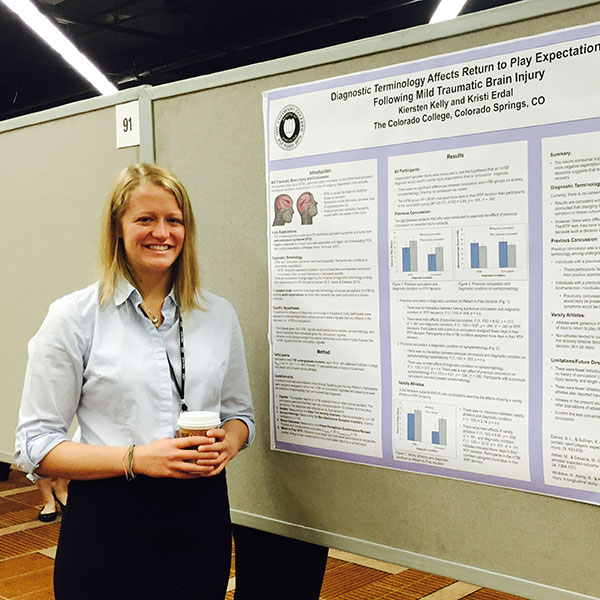Kiersten Kelly ’16, who graduated cum laude from Colorado College with a degree in neuroscience, has had her senior thesis accepted for publication in the Journal of Clinical and Experimental Neuropsychology.
The article, titled “Diagnostic terminology, athlete status, and history of concussion affect return to play expectations and anticipated symptoms following mild traumatic brain injury,” is the result of research Kelly conducted with Colorado College Professor of Psychology Kristi Erdal.
Their article states that “mild traumatic brain injury” and “concussion” are terms often used interchangeably. However, “mild traumatic brain injury” is frequently seen as representing a broader injury that encompasses “concussion,” which often conveys lesser severity. The study examined the influence of varying diagnostic terminology on acute injury expectations in an undergraduate population. Participants were presented with a mild traumatic brain injury vignette and were randomly assigned to one of two conditions in which the term “mild traumatic brain injury” or “concussion” was used to describe the injury.
There were no significant differences between the two conditions on anxiety, symptomatology, timeline, or consequence scales. However, participants in the “mild traumatic brain injury” group allocated more days to return to play than participants in the “concussion” group.The study showed that “mild traumatic brain injury” was associated with worse predicted outcomes, with students predicting greater symptomatology and more negative illness perceptions when shown a diagnosis of “mild traumatic brain injury” than when shown a diagnosis of “concussion.”
“An interesting finding was that athletes and those with a history of concussion tended to more accurately portray the days required to return to play, whereas non-athletes and those without a history of concussion tended to overestimate the recovery timeline,” notes Kelly, who will be starting at University of California–Davis School of Medicine in the fall. “This is important because overestimations could potentially prolong post-concussion symptoms and underestimations could cause individuals to use less caution and to not take the possibility of another injury seriously.”
Kelly and Erdal’s research suggests that terminology, athlete status, and history of concussion all influenced injury expectations among undergraduate students, and clinicians should consider these influences on perceptions of the severity of an injury.
